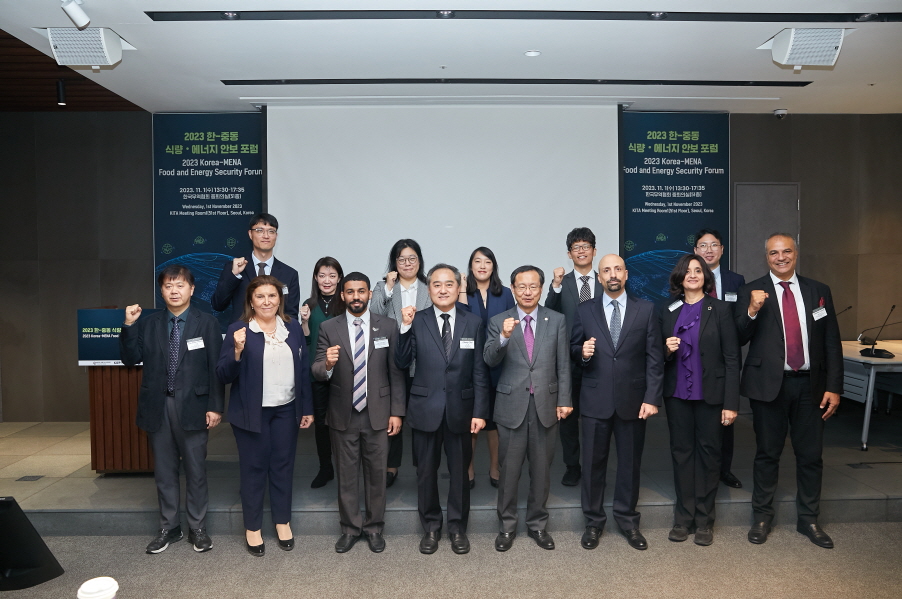
The '2023 Korea-Middle East Food and Energy Security Forum,' hosted by the Korea-Arab Society (KAS) and the Korea Institute for International Economic Policy (KIEP) and sponsored by the Ministry of Foreign Affairs of the Republic of Korea, took place on November 1 in the conference room of the Korea International Trade Association(KITA).
The forum brought together various participants, including the Vice President of KIEP, Chung Chul, Secretary-General of KAS Kim Chang-mo, and Chargé d'Affaires of the Qatar Embassy in Korea, Mishal Saad AL-KUWARI , as well as other Arab diplomats, academics and other attendees interested in Korea-Middle East food and energy security. The event was divided into two sessions. The first session focused on Korea-Middle East cooperation on climate change and food security, and the second session revolved around Korea-Middle East cooperation for energy transition.
Professor Kim Kang-suk from Hankuk University of Foreign Studies conducted an analysis of MENA regional media's awareness of food security using text mining techniques. During his presentation, he introduced the concept of public-private partnerships (PPP) as a means for Korean companies to expand their presence in the MENA region. Additionally, he suggested measures to promote cooperation and integrate ESG (Environmental, Social, and Governance) principles into official development assistance (ODA).
Professor Nabiha Bouzouita from the Department of Economics at Carthage University in Tunisia, provided an overview of Tunisia's food security situation and the challenges it faces. She also offered potential solutions, such as improving agricultural productivity and leveraging food waste and by-products through food science research. As an illustrative example, Professor Nabiha introduced methods for creating nutritious foods from by-products generated in the olive oil, wine, and almond manufacturing processes.
Following Professor Nabiha, Ro Yoon-Jae, an Associate Researcher Fellow of the India and South Asia Team at KIEP, presented the findings of a global public opinion survey on climate change, focusing on urban residents' awareness and its implications in 192 countries and regions. The results revealed that respondents in Latin America expressed the highest level of concern about climate change, while those in Southwest Asia and North Africa showed the least concern.
Kang Moon-soo, the head of KIEP's Africa and Middle East team, emphasized that the food security situation in low- and middle-income countries in the MENA region is more challenging than in GCC countries. This is due to several factors, including a high reliance on food imports, water scarcity, land degradation issues, and food price subsidies. He also suggested collaboration between Korea and the Middle East such as desalination projects, crop genetic enhancement, digital technology-driven irrigation, and the implementation of smart farming.
Adel Ben Youssef, a professor of economics at the University of the Côte d'Azur in France, emphasized the critical role of renewable energy in the Middle East for water, energy, and food security. He noted that renewables capacity increased by 50% since 2022 and is expected to increase another 50% by 2024. However he highlighted that MENA needs 20 times that capacity to replace existing gas-fired generation, and necessitates deep reforms and a dynamic financial market to support renewable energy development.
Hala Abou Ali, a professor of economics at Cairo University in Egypt, pointed out that non-oil-producing MENA countries face challenges in securing funding for climate change adaptation programs. She also emphasized that climate change could exacerbate social and political instability as well as economic imbalances. She highlighted the Middle East region's comparative advantage in terms of solar panel installation costs, and stressed the significance of regional cooperation in the transition to renewable energy.
Ryou Kwang-Ho, Senior Researcher of Africa and Middle East Team at KIEP, highlighted that although demand for fossil fuels is likely to increase in the near future, the development of natural gas, which will serve as a bridgehead for energy transition, is accelerating in the Middle East. He also explained the current situation of the on-going project for blue hydrogen technology in Saudi Arabia, the UAE and Egypt, and emphasized the potential for cooperation between Korea and the MENA, which encompasses infrastructure projects, including joint development of natural gas, FLNG, and pipelines, as well as exchanges of human resources.
Lastly, Li-chen SIM, a professor of the College of Humanities and Social Sciences at Khalifa University in the UAE, presented on the topic, "How Korean Companies Can Leverage the Low Carbon Energy Transition in the Gulf States." She suggested maximizing the increasingly limited space for fossil fuels by advocating for lower carbon and lower emission fossil fuels, including fossil fuels with CCS(Carbon Capture and Storage) technology, and mentioned about importing blue ammonia to reduce carbon emissions in the chemical, refining, and steel industries. She also highlighted the opportunity for Gulf-based Korean companies to avail of clean energy certificates and leverage the South Korea-UAE Comprehensive Economic Partnership Agreement.
| Previous | MOU signed between Korea-Arab Society(KAS) and Gyeongsangbuk-do Culture & Tourism Organization(GCTO) |
|---|---|
| Next | The next article does not exist. |